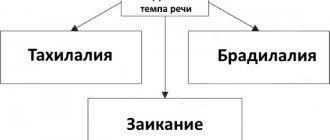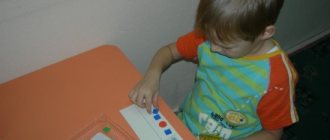Speech disorders
- these are difficulties in communicating with others: impaired pronunciation and grammatical structure of speech, poor vocabulary, impaired tempo and fluency of speech, complete or partial absence of speech in the child.
Speech disorders occur for various reasons
: congenital abnormalities of the central nervous system, cerebral cortex, tongue, palate, improper nasal breathing and decreased tone of the soft palate, mental trauma (for example, in impressionable children, fear can provoke stuttering), etc.
In Russia, two classifications of speech disorders are used: clinical-pedagogical and psychological-pedagogical.
Clinical and pedagogical classification
This classification of speech disorders is based on medical criteria and is focused on the correction of speech defects.
Voice production or phonation disorders
The child has pronunciation disorders, specifically difficulties with voice formation. These disorders appear due to malfunctions of the vocal apparatus or underdevelopment of speech centers.
Dysphonia
- voice disturbance - hoarseness, weakness and hoarseness.
Rhinophony
- nasal (nasal) tone of voice due to incorrect direction of the vocal exhalation stream.
Phonasthenia
- voice disorder due to discoordination of the respiratory, articulatory, phonation and resonator apparatus.
Aphonia
- lack of voice.
Disorders of tempo and rhythm of speech
These defects are caused by insufficient development of the articulatory apparatus and speech breathing.
Tahilalia
- pathologically accelerated rate of speech (instead of 10–12 sounds per second, 20–30 are pronounced), not accompanied by sharp distortions of sound pronunciation.
Bradylalia
- pathologically slow speech rate. With bradylalia, speech is excessively slow, with prolongation of vowel sounds, and sluggish, unclear articulation.
tripping
- against the background of accelerated speech, repetition of words, syllables and sounds occurs. Unlike stuttering, stumbling does not originate from spasms of the speech apparatus. A child or adult with a stumble has no fear of speaking up.
Stuttering
— during a statement, involuntary stops occur that are beyond control. They are accompanied by convulsions of all parts of the speech apparatus.
Sound pronunciation disorders
Dislalia
— violation of the pronunciation of sounds with intact innervation of the articulatory apparatus and normal hearing.
Rhinolalia
- disorders of articulation and voice formation caused by defects in the structure and functioning of the speech apparatus.
Dysarthria
- a disorder of the pronunciation organization of speech associated with damage to the central part of the speech motor analyzer and a violation of the innervation of the muscles of the articulatory apparatus.
With such disorders, there is underdevelopment of other components of speech: phonemic processes, vocabulary, grammar, and coherence of speech.
Structural-semantic disorders
Alalia
- poor vocabulary, agrammatism, incorrect construction of syllables, disturbances in the pronunciation of sounds. It happens that a child does not understand speech addressed to him. Alalia occurs when the speech areas of the brain are damaged. At the same time, the child is fine with intelligence and hearing.
Aphasia
is also a systemic speech disorder. To one degree or another, sound pronunciation, vocabulary, grammar, speech understanding, reading and writing suffer. It occurs as a result of organic lesions of the areas of the cerebral cortex that are responsible for controlling speech and the adjacent “subcortex”. It differs from alalia in that it is not a congenital phenomenon, but an acquired one - the possibility of verbal communication is lost in people who already know how to speak. Usually occurs as a result of a stroke in adults.
Writing and reading disorders
Dysgraphia
— partial disorder of the writing process: omissions of letters, words, their rearrangements; replacing and mixing similar letters; violations of grammatical agreement and control of words in a sentence. Dysgraphia occurs when the mental functions of writing control are insufficiently formed (or disintegrated).
Agraphia
- complete immaturity or loss of writing skills. The collapse of written speech always accompanies the loss of oral speech (aphasia). Sometimes with agraphia, copying is possible, but with the omission of letters and syllables; A person cannot cope with writing from dictation. Self-control and self-correction are often absent.
Dyslexia
- the child confuses right and left, up and down; sequence of letters, syllables, numbers when reading; refuses to read aloud. This is a partial disorder due to insufficient formation (or decay) of the mental functions responsible for the ability to read.
Psychological and pedagogical classification
The psychological and pedagogical classification takes into account the structural components of the speech system (sound aspect, grammatical structure, vocabulary), functional aspects of speech, and the relationship between oral and written speech.
Speech disorders in the psychological and pedagogical classification are divided into two groups.
Disruption of means of communication
PHONETIC-PHONEMATIC UNDERDEVELOPMENT
(FFN)
FND is a violation of the formation of the pronunciation of sounds of the native language in children with various speech disorders. It arises due to defects in the perception and pronunciation of phonemes.
The main manifestations of FFN:
Undifferentiated pronunciation of pairs or groups of sounds
- “tyumka”, “tyaska”, “chopper” instead of “bag”, “cup”, “hat”.
Replacing some sounds with others
- when a child pronounces a sound that is easier for him to reproduce. For example, “L” instead of “R”, “F” - instead of “W”.
Mixing sounds
- when a child can pronounce the sounds “R”, “L” or “S” separately, but makes mistakes in speech statements. For example, “a carpenter is planing a board” instead of “a carpenter is planing a board.”
GENERAL SPEECH UNDERDEVELOPMENT (GND)
OSD are various complex speech disorders in which the formation of all components of the speech system is disrupted: the sound side (phonetics) and the semantic side (vocabulary, grammar).
ONR can be observed in complex forms of childhood speech pathology: alalia, aphasia (always), as well as rhinolalia, dysarthria.
There are four levels of ONR:
OHP level 1
- the child completely lacks coherent speech - “speechless children”. The child tries to convey his thoughts to others using gestures or extremely unclear, simplified speech.
OHP level 2
— initial speech is developed, but the vocabulary is extremely poor. The child pronounces most words incorrectly. Making mistakes, he can compose and pronounce the simplest sentence of several words.
OHP level 3
— is quite good at composing sentences, but pronounces words with errors, and the meaning of the sentences may not be clear to others.
OHP level 4
— speaks well, knows how to make sentences. The speech of a child with ODD at this stage is practically no different from his peers. Problems arise only when composing long phrases.
Violations in the use of means of communication
Stuttering
- a disorder of the tempo-rhythmic aspect of speech, caused by repeated convulsions in the articulatory, vocal or respiratory parts of the speech apparatus. A combined defect is also possible, in which stuttering is combined with OHP.
Non-convulsive disturbances in the tempo and rhythm of speech
- stumbling, tachylalia, bradilalia.
Diagnostics
The diagnosis of onr can only be made by conducting a comprehensive study. Diagnosis is carried out at an initial consultation with a speech therapist. The specialist establishes contact with the child, the parents must have medical reports from a neurologist, pediatrician, and the results of the studies. Having received all available information, the specialist studies and determines the speech status of his patient.
Speech therapy research is carried out in two stages - orientation and language examination. The orientation is carried out through a conversation with parents. This way, all the features of the course of the disease are clarified, what reasons accompanied it, and how the speech apparatus developed. The patient himself is also assessed - his ability to make contact, articulatory motor skills.
When examining the language and its components, the formation of speech, its coherence, grammar, and vocabulary are determined. In the case of the presence of OHP of the first degree, there is a gross underdevelopment of all components of the language system, which is explained by the child’s lack of commonly used speech. After this, the specialist can draw up his conclusion and establish the clinical form of the pathology of the speech apparatus.
It is important to distinguish insufficient speech development from other forms, such as speechlessness, autism, mental disabilities, hearing impairments, etc.
Recommended speech therapy examination
It is worth studying in detail the vocabulary of a person suffering from OPD. This will allow you to assess the ability to correlate a word with a specific subject. This is done in several steps:
- Selection of material, divided into individual lexical topics. This determines the child’s ability to communicate with the people around him.
- Pictures with objects are offered.
- Pictures with names of body parts are used.
- Selection of synonyms for the selected word.
During the diagnosis, the speech therapist must give his conclusion, which indicates the level of speech development, the clinical picture, the degree of OHP, and also draw up a plan for correcting the identified disorders.
Speech Disorder Specialists
Speech therapist.
Most speech disorders are a speech therapy problem, which is why speech therapists should be contacted first.
Neurologist
provides medication support to children with cerebral palsy, alalia, dysarthria, etc.
A defectologist is able to significantly “pump up” a child’s brain, develop intelligence and thinking.
An otorhinolaryngologist determines pathologies of the peripheral speech apparatus of a medical nature: hearing loss, cleft palate, adenoid growths, sore throat, etc.
A teacher of the deaf is involved in the development of speech in deaf and hard of hearing children and adults.
Psychologist. Due to shyness or aggressive behavior, the child’s speech is distorted and impoverished. Problems in the family and with peers can cause delayed speech development.
Neuropsychologist (clinical psychologist) - in case of speech disorders (caused by impaired brain function), teaches the child’s brain to function correctly through motor and play exercises.
| Defectology and speech therapy, as well as Neurology services are available in our center. |
Correction of the disorder
Corrective work on OHP should only be carried out by a qualified specialist. Preschool children with the first degree of speech impairment attend special speech therapy groups in kindergarten. They must enter here at the age of 3-4 years, and the classes themselves are conducted in groups, subgroups and individually. The purpose of correction is to transfer the child to another stage of speech development, to compensate for all existing deviations.
This work is carried out simultaneously in various directions:
- Speech understanding. This problem can be better solved by conducting classes in a playful way. The child must find toys that the specialist names for him, show the correct pictures, expand his vocabulary, and master the pronunciation of phrases, phrases, and multi-word phrases.
- Speech activation. Development of onomatopoeia in a child, for example, the voices of various animals, musical instruments. This stimulates his speech activity. Pronouns, verbs, and addressing an adult are gradually introduced into speech.
- Non-speech development. Correct speech is impossible without the development of auxiliary mechanisms - concentration, development of thinking, memory. Much attention should be paid to the intellectual and mental development of the child. Auxiliary techniques include logorhythmics, speech therapy massage, development of fine motor skills and articulation.
At the last stage, sound pronunciation must be performed with correct grammar and speech format. Treatment of second-degree ODD includes the development of the child’s speech skills, his understanding of adult speech, and training of the lexical and grammatical component. At the third degree, coherent semantic speech is formed, vocabulary and grammar are improved, and correct articulation is consolidated. A lot of time should be devoted to mastering the necessary literacy.
For children with SEN IV, it is important to achieve their age-specific speech standards, which is necessary for successful studies at school. Schoolchildren with severe forms of ODD are trained in schools created to work with children with speech disorders. Here the emphasis is on compensation for all aspects of the manifestation of speech underdevelopment1.
Tips for parents
It is important for the child to create a positive speech environment.
Repeatedly talk through ordinary, daily activities:
dressing, washing, eating, bathing, walking, getting ready for bed, going to bed, cleaning the room and toys, cooking. All these processes must necessarily be accompanied by the speech of adults.
Say nursery rhymes, tongue twisters, proverbs, proverbs, sing songs
.
Talk to your child as often as possible
, listen carefully to his answers to questions. This will not only improve your baby’s speech, but will also establish a trusting relationship between you.
Read together
, discuss what you read, illustrate the plot together, discuss the drawings.






